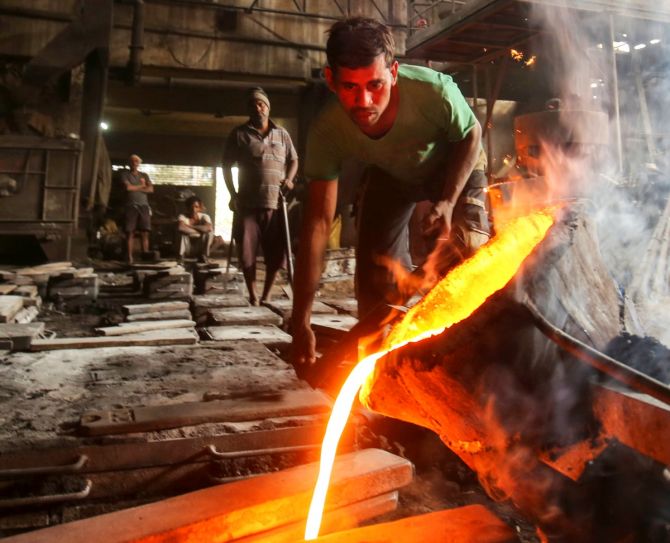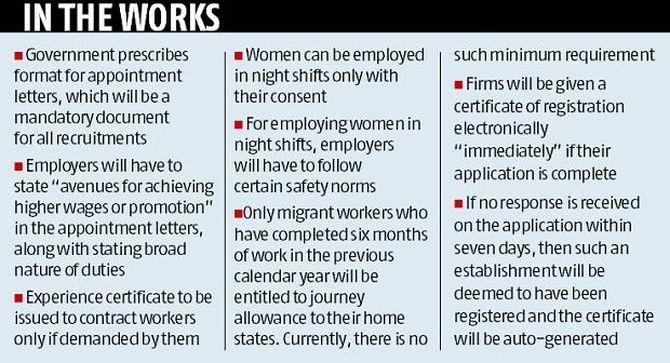
The central government has proposed to increase the maximum work-day of a factory worker by one-and-a-half hours.
According to the proposal, a worker may be allowed to work in a factory for 12 hours a day as against the current limit of 10.5 hours.
The government has also, for the first time, proposed that migrant workers should meet some minimum conditions to be eligible to receive allowance from their employers to travel to their home states.
'The period of work of a worker shall be so arranged that inclusive of his intervals for rest, shall not spread over for more than twelve hours in a day,' the draft Occupational Safety, Health and Working Conditions (Central) Rules, 2020, dated November 19, said.
The move, say labour experts, will incentivise employers to opt for two work shifts instead of three, thereby reducing employment opportunities.
However, in calculating overtime on any day, a fraction of an hour between 15 and 30 minutes shall be counted as 30 minutes. At present, less than 30 minutes is counted as no overtime.
As they battled the economic impact of the coronavirus pandemic, Uttar Pradesh, Punjab, Gujarat and Haryana were among the states that relaxed the norms related to 'spread-over hours' allowed for factory workers, pushing them to 13 hours.
"If employers keep the workers for full 12 hours on the worksite and include travel time, which in metros would easily be another 60 minutes, then the work-life balance of the workers will be adversely affected," says K R Shyam Sundar, labour economist and professor at XLRI Jamshedpur.
For migrant workers, who receive journey allowance in cash from employers to travel to and from their domicile states, the government has proposed to set minimum qualifying conditions for the first time.
Only migrant workers who have completed six months of work in the previous calendar year will be entitled to it. Currently, there is no such requirement under the law.
In case a migrant worker switches job before six months, then the new employer will count the previous period of employment (based on an experience certificate from the previous employer), too, while giving the journey allowance.
However, the government had also widened the scope of covering migrant workers under the new labour laws.
All workers earning up to Rs 18,000 a month who migrate from one state to another will be a part of it.
Under the present law, migrant workers were covered under labour laws only if they were hired through contractors.
As a result, migrant workers who travelled on their own for work remained outside the ambit of the labour laws.

The government has also mooted to make it mandatory for employers to conduct annual medical check-up on only a limited set of workers -- those who are above the age of 45.
Employers belonging to manufacturing, mining and construction sector will have to conduct such medical examination by April every year, according to the draft rules.
"It will exclude a good proportion of workers in a factory and in other covered establishments. This not only constitutes as an 'age discrimination' practice but also segments the workforce in an establishment by age," says Sundar.
"For most new and technology-oriented establishments, where the percentage of younger workers is higher, the labour cost will be less."
The government has proposed to significantly shorten the time for registering firms under labour laws.
Firms will be given a certificate of registration electronically 'immediately' if their application is complete and the maximum it would take is seven days, 'failing which such establishment shall be deemed to have been registered and the certificate shall be auto-generated'.
Firms already in operation will not have to apply for a registration certificate but will have to update their registration particulars on the government's Shram Suvidha portal within six months of the date from which the new labour law comes into force.
Further, the ministry said that safety committees have been made mandatory for every establishment employing at least 500 workers.
Employers will have to give appointment letters -- 'in prescribed format including designation, category of skill, wages, avenue for achieving higher wages/higher position etc' -- to every employee of an establishment within three months of the rules coming into force.
No one will be employed in any establishment unless s/he has been issued a letter of appointment.
In the absence of such legal documents, workers often find it difficult to establish proof of employment, and this gives companies the room to violate labour laws and ignore their social security obligations.
More than two-thirds of India's workers who earn a regular income do not have a written contract, according to the National Statistical Office's periodic labour force survey.
In the case of contract workers, however, the government has proposed that the experience certificate be issued only if the worker demands it.
The certificate will include the particulars of the workers and the experience gained in various fields by them.
Feature Presentation: Rajesh Alva/Rediff.com












 © 2025
© 2025